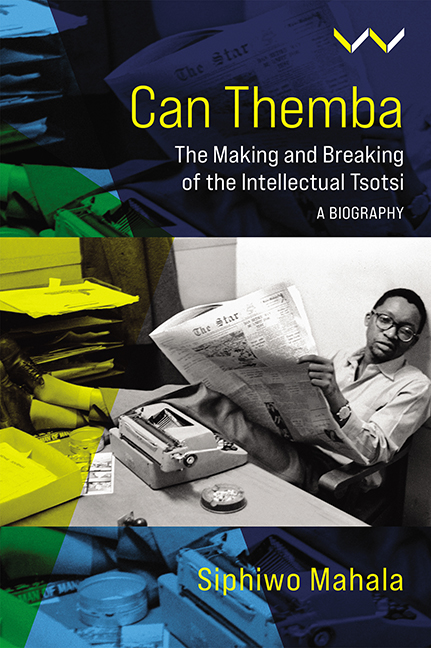Book contents
- Frontmatter
- Dedication
- Epigraph
- Contents
- List of Illustrations
- Acknowledgements
- Introduction
- PART I Death and Birth of a Scribe
- PART II ‘Live Fast and Die Young’
- PART III The ‘Intellectual Tsotsi’
- PART IV Dances with Texts: Writing and Storytelling
- PART V A Writer’s Immortality
- Postscript: The Three Burials of Can Themba
- Notes
- Bibliography
- Index
2 - The Poet Laureate of Fort Hare
Published online by Cambridge University Press: 26 May 2022
- Frontmatter
- Dedication
- Epigraph
- Contents
- List of Illustrations
- Acknowledgements
- Introduction
- PART I Death and Birth of a Scribe
- PART II ‘Live Fast and Die Young’
- PART III The ‘Intellectual Tsotsi’
- PART IV Dances with Texts: Writing and Storytelling
- PART V A Writer’s Immortality
- Postscript: The Three Burials of Can Themba
- Notes
- Bibliography
- Index
Summary
Can Themba was the one who was preoccupied with …the poetry of immediacy, the poetry of proximity.
Muxe Nkondo — Interview (2015)‘The winning prize of £3 3s. 0d. goes to the writer of the following poem,’ read a December 1949 article in Zonk magazine. The poem was titled ‘Recollection’, written by someone simply called Doce. At the bottom of the page, the author byline read, ‘This writer used to be known as the Poet Laureate of Fort Hare. He now lives in Sophiatown.’
The author was none other than the man who would emerge four years later as the winner of the £50 first prize for the Drum short story award. Daniel Canodoce Themba, popularly known as Can Themba, was born in Marabastad on 21 June 1924. At that time, Marabastad was an overcrowded, vibrant, colourful and multicultural place, consisting mainly of black, coloured and Indian communities. The severe overcrowding that characterised Marabastad was largely the result of its history as a trading area; the government of the time tried to control the congestion by establishing more housing units in the surrounding areas. Themba's family ultimately relocated to Attridgeville, a black township west of Pretoria, founded in 1939 as an attempt to solve the overcrowding problems in Marabastad. Here they lived at 5 Ntlatleng Street. He moved to Sophiatown once he started working as a teacher in Johannesburg.
Themba wrote under different pen names, including Doce, D. C. Themba, D. Canodoce Themba, D. Can Themba, Can Themba, Parks Mangena and Morongwa Sereto, amongst others. The first available record of his publications dates back to 1945, when he published a poem entitled ‘Thirst in the Hearts of Men’, in a journal of the South African Native College (SANC), the former name for the University of Fort Hare. Coincidentally, this poem appeared alongside Dennis Brutus's first published poem, titled ‘Rendezvous’, under the pen name Le Dab. In 1947, Themba produced a poem titled ‘Dedication’, and a short story titled ‘Revelation’, both published in different editions of The Fort Harian, a student journal.
While there is no doubt that winning the Drum short story award was a major breakthrough in Themba's writing career, his was a talent that had been simmering for a number of years
- Type
- Chapter
- Information
- Can ThembaThe Making and Breaking of the Intellectual Tsotsi, a Biography, pp. 20 - 29Publisher: Wits University PressPrint publication year: 2022



